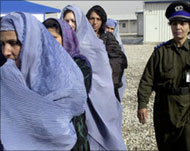Afghan presidency race kicks off
The official month-long campaign for Afghanistan’s first-ever direct presidential election since the 2001 ouster of the Taliban, has opened.

Incumbent President Hamid Karzai, who has the strong backing of the United States and the West, is seen as favourite to win the 9 October poll, but rivals may force him into a run-off.
Ahead of his own election showdown, US President George Bush might be keen to be able to hold up Afghanistan as a relatively successful foreign-policy initiative to balance the difficulties he has faced in the subsequent US-led invasion of Iraq.
Security has been an overriding concern. Taliban fighters and their allies have vowed to disrupt the polls and close to 1000 people, including security forces, election workers, aid workers and civilians, have been killed in a campaign of violence over the past 12 months.
The violence continued despite the efforts of an 18,000-strong US-led force hunting the fighters.
During the campaign, which lasts until 6 October, candidates are promised equal access to state-run media and can hold rallies and deliver speeches in the provinces.
 |
|
There are concerns that Karzai |
However, candidates have expressed concern that Karzai has an unfair advantage when it comes to state media resources.
A report by the Afghan Independent Human Rights Commission and the United Nations pointed to a nationwide pattern of self-censorship, given concerns about intimidation.
The latter was particularly the case in the northeast, south and west, where powerful factional leaders hold sway.
Delay
Both the presidential and parliamentary polls were due to be held last June, but were delayed owing to security and logistical concerns. Parliamentary elections were put off until next April because resources are overstretched.
There are 18 candidates for the October vote, but the field is expected to be whittled down as the weakest candidates form alliances.
 |
|
Women account for 41% of the |
More than 10.5 million of a population of between 25 million and 28 million have registered to vote, far surpassing earlier expectations but raising allegations of multiple registrations.
Voting will also take place among the hundreds of thousands of Afghans still living as refugees in neighbouring Pakistan and Iran, where campaigning is also technically permitted.
Victory requires 51% of the vote, otherwise a run-off will be called, which could delay results until November.
Challengers
Karzai’s closest challenger appears to be former education minister Yunus Qanuni, a leading member of the Northern Alliance, the grouping of ethnic minority factions that united against the Taliban and helped overthrow it in 2001.
He must bind the Northern Alliance’s myriad factions if he is to have a hope of beating Karzai, a task no one has yet managed.
Qanuni appears to have the support of powerful Defence Minister and Northern Alliance leader Muhammad Fahim, who had once been tipped as Karzai’s running mate, as well as that of his long-time colleague, Foreign Minister Abd Allah Abd Allah.
The three ethnic Tajiks may also try to bring on board ethnic Uzbek General Abd al-Rashid Dostum and ethnic Hazara Haji Muhammad Mohaqiq to broaden their ethnic support base. Both Dostum and Muhaqiq are candidates for president.
Despite Afghanistan’s conservative Islamic values, women account for more than 41% of registered voters, and there is one female candidate, Massuda Jalal, a doctor who has attracted much media attention but little following.